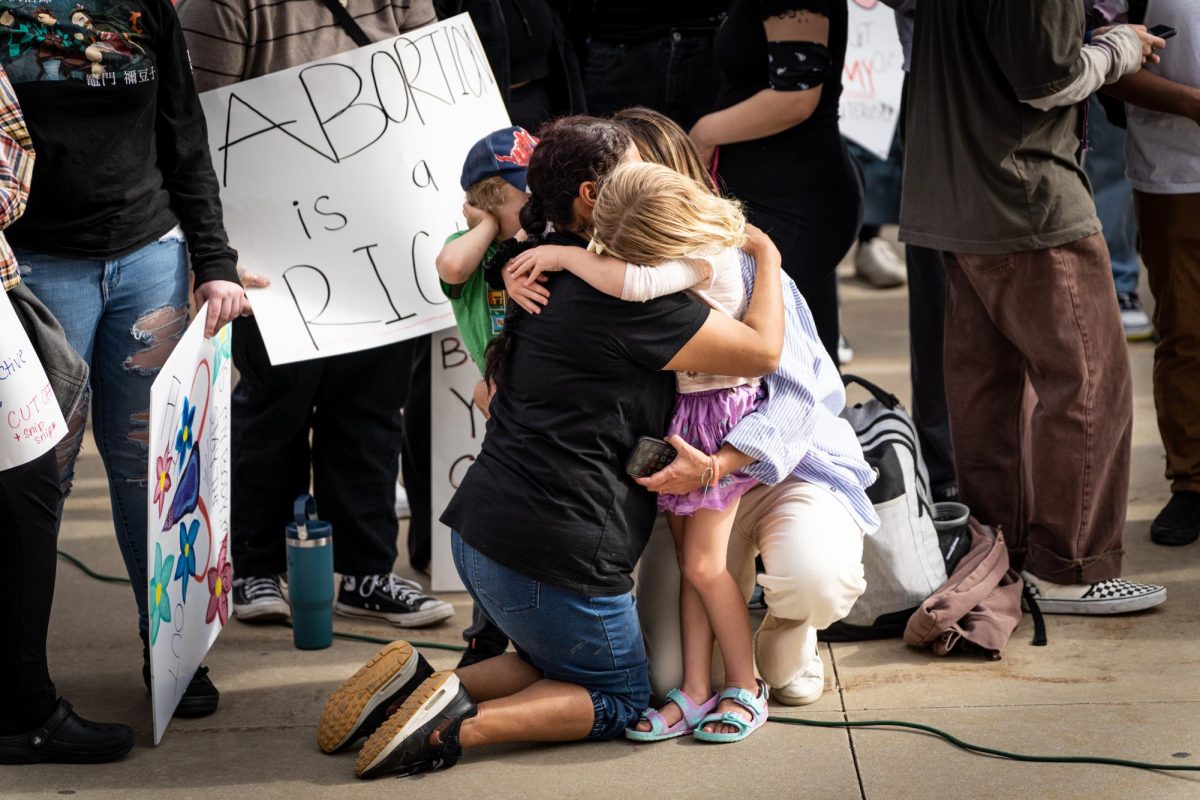Jarvis: Utah Isn’t Pro-Family
A child hugs a protestor at the protest of the potential overturn of Roe V. Wade at the Utah State Captiol on May 5, 2022. (Photo by Xiangyao Tang | The Daily Utah Chronicle)
July 17, 2023
From 1973 on, pregnant people in the U.S. had the legal right to abortion due to the ruling of Roe v. Wade. In June of 2022, the ruling was overturned, upon the claim that abortion is not protected under the constitutional right to privacy. Since this news, I have been grieving with many others across the country for the loss of accessible reproductive care and the beginning of an unknown, bleak future.
One in four people with a uterus will have an abortion, often for the sake of their family. This decision could look like choosing not to raise a child in an abusive household, an inability to afford another child or planning for a family. Utah legislators’ persistence in banning abortion shows that they truly don’t care about the well-being of families in the state.
Utah created a “trigger law” in 2020 that banned abortion the moment Roe v. Wade was overturned, with exceptions for rape and incest victims as long as they report the crime. But sexual assault is vastly underreported, and even when reported, these exceptions are not always granted. Forcing survivors to report to law enforcement is re-traumatizing and puts the responsibility on them.
So much for a right to privacy.
While the trigger law was put on hold due to a preliminary injunction following a lawsuit, an abortion ban after 18 weeks of gestation has already gone into effect. The 18-week limit now applies to victims of rape or incest per a different bill, titled Victim Services Amendments, that passed during this year’s legislative session. During the session, the state also passed a bill that regulates injunctions, which could cause courts to reconsider the current block on Utah’s trigger law.
Gov. Spencer Cox, who in June stated his belief “that Roe was very wrongly decided,” just signed H.B. 467, which will completely close abortion clinics by 2024. Abortion in Utah will be illegal.
Families Need Reproductive Care
About half of Utah residents who have abortions already have kids. Most people seek abortions due to poverty, and denying abortion often pushes families deeper into poverty. H.B. 467 only allows for abortions in cases of reported rape and incest and in specific medical circumstances. It mandates an abortion be done at a hospital, which is much more expensive than a clinic and affects lower-income individuals more. Traveling out of state for the procedure provides a costly and more time-consuming alternative.
Being forced into parenthood stunts women’s advancement and their careers, putting their families in a difficult situation if they rely on the pregnant person’s income. This especially affects people of color, who have the highest abortion rates. Additionally, the ban harms queer families disproportionately and increases barriers to healthcare that trans and non-binary individuals already face. People who are both Black and transgender may be affected the most.
Moreover, restricting abortion harms mental health and increases the risk of domestic abuse among those with unwanted pregnancies.
Much of the legislation on abortion is ambiguously worded, which creates uncertainty for healthcare providers and poses a danger for pregnant people. Medically, abortion can be the best route in many cases, and doctors should be able to freely decide if their patients need an abortion without fear of a felony charge.
It’s undeniable: family healthcare must include abortion.
Legislature That Affects Families
Some pro-family bills have passed this year, including bills that fund education, allow for more religious freedom in schools, help prevent domestic violence fatalities and protect minors on social media.
But when it comes to reproductive care, an important sector of healthcare for families, our legislators are anti-family. They attempted to pass H.B. 256 this year, a bill that would allow pregnant people to drive in the HOV lane, counting a fetus as an occupant of the car. The nature of the bill is manipulative — to qualify a fetus as a person for traffic laws is a transparent effort to influence the way Utahns view healthcare laws. It’s another of Utah’s attempts to convert uteruses into government-inspected scenes and increase regulations instead of helping families.
Lawmakers could help people who have unwanted pregnancies by providing paid parental leave or greater access to Medicaid. They could work on reducing the gender wage gap and get to the roots of why people need abortions. Instead, they restrict abortion, harming families and causing preventable deaths.
Abortion isn’t the only topic our legislators take an anti-family stance on. A bill that restricts gender-affirming treatments and procedures for transgender people also passed this year. This medical care reduces suicide rates in youths, which makes it necessary family healthcare.
Utah lawmakers turn their backs on families in areas where they need the most support, attacking them in the form of abortion restrictions and other disturbing bills. We deserve reproductive healthcare for the sake of our families and ourselves.









